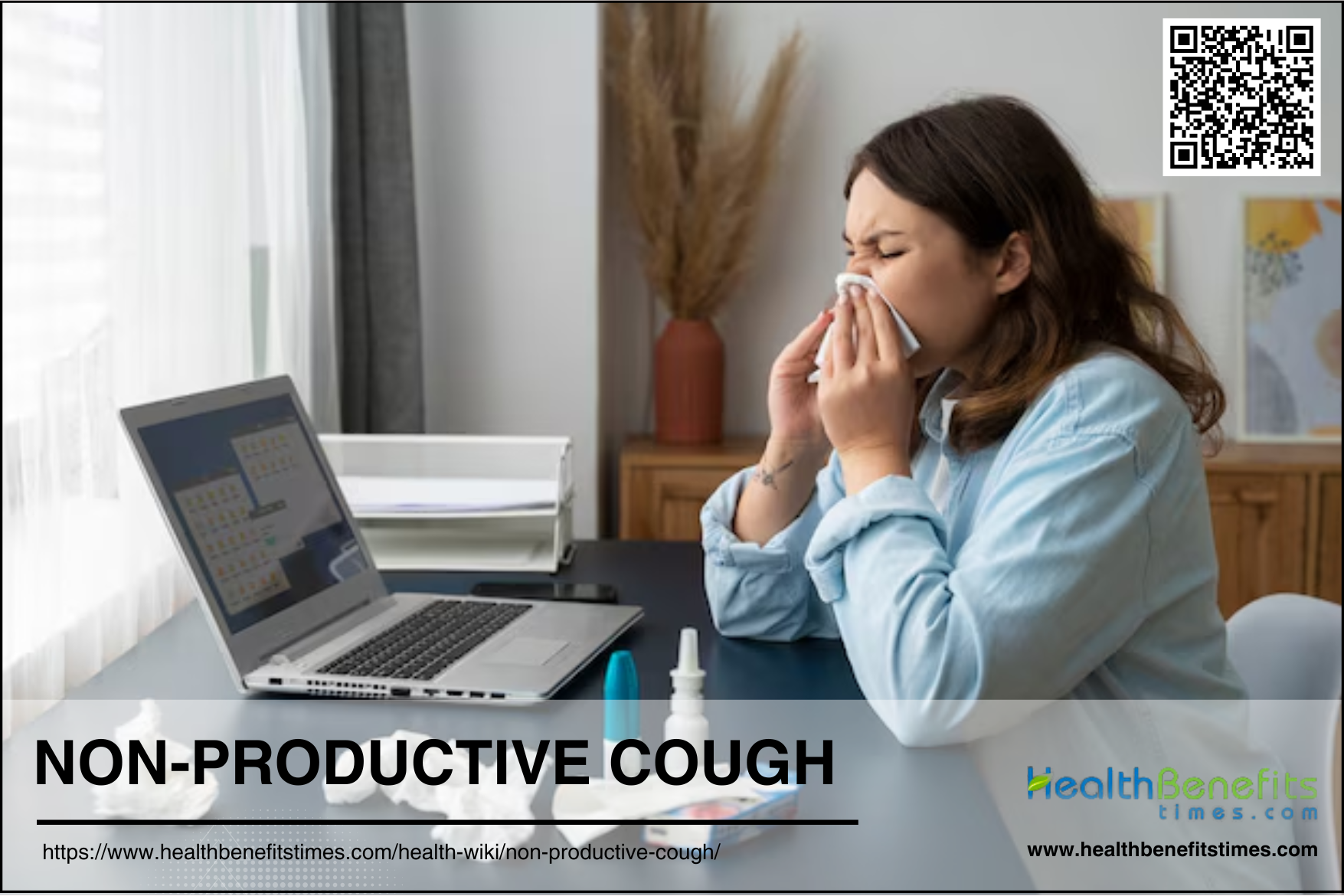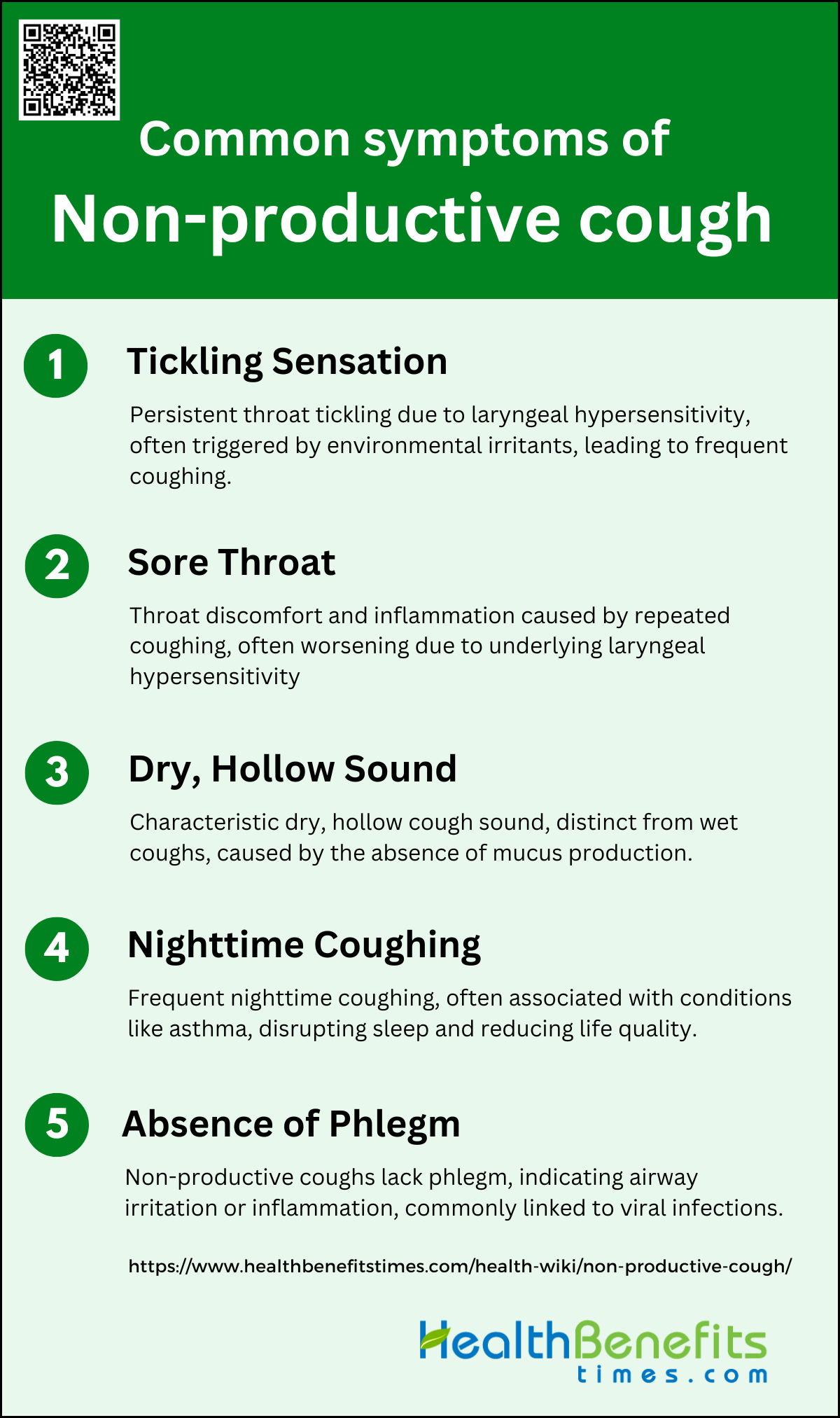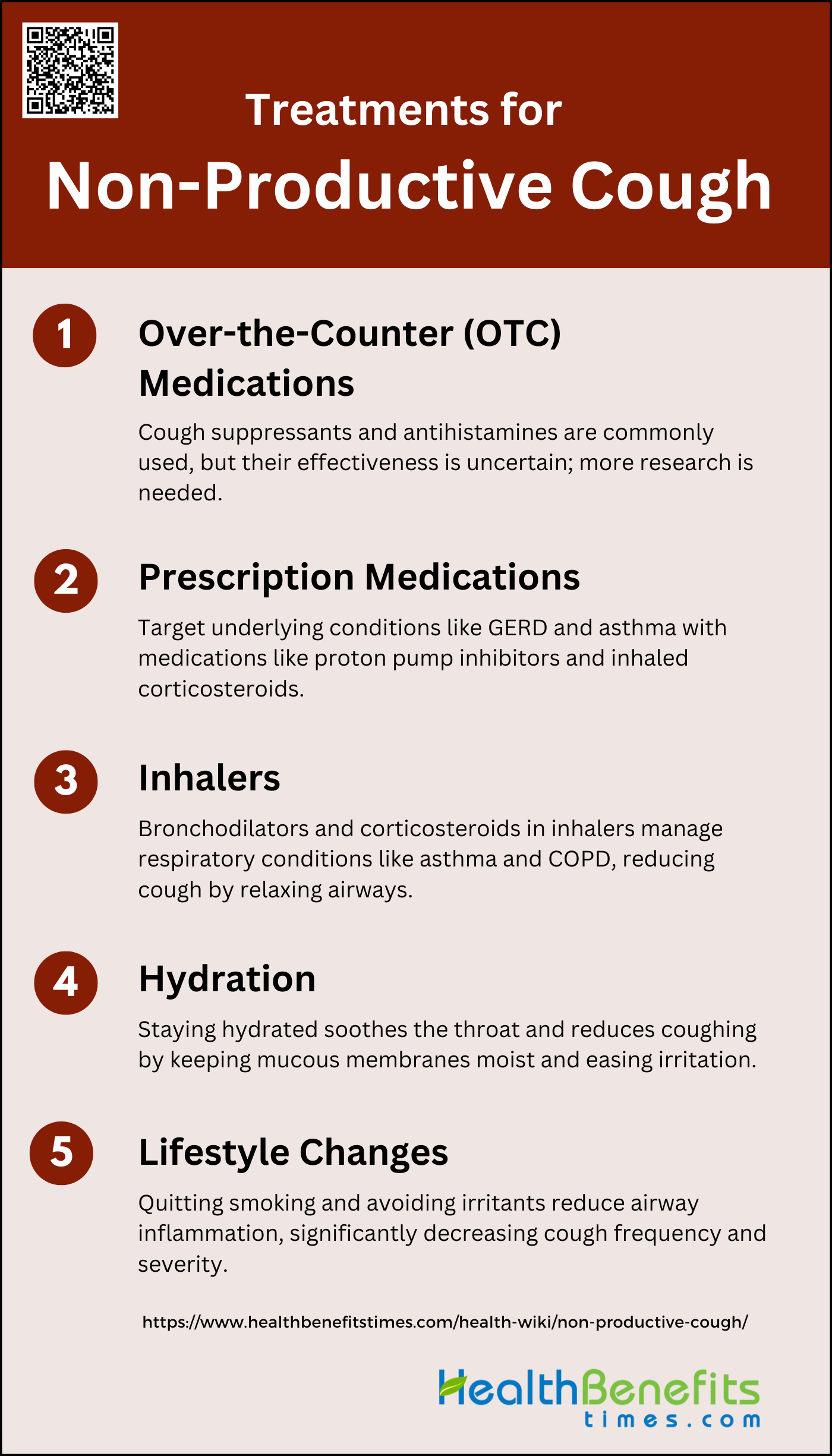A non-productive cough, also known as a dry cough, is characterized by the absence of mucus or phlegm production. Unlike productive coughs, which help clear mucus from the respiratory tract, non-productive coughs do not serve this purpose and can be caused by various factors including asthma, post-nasal drip syndrome (PNDS), and gastro-oesophageal reflux (GOR). Non-productive coughs are often associated with an increased sensitivity of the cough reflex, which can be triggered by irritants such as capsaicin. This type of cough is more prevalent in females and can be related to conditions like asthma, rhinitis, and exposure to tobacco smoke. Management of non-productive chronic cough often involves identifying and treating underlying conditions, and may include non-pharmacological therapies such as cough suppression techniques and breathing exercises. Automated systems using sound analysis have shown promise in accurately classifying cough types, which can aid in diagnosis and treatment.
Differences between productive and non-productive coughs
A productive cough, often referred to as a “wet” cough, is characterized by the presence of excess airway secretions, which are expelled from the respiratory tract during coughing. This type of cough is commonly associated with conditions such as bronchiectasis, chronic bronchitis, and infections, where mucus production is increased. In contrast, a non-productive cough, or “dry” cough, does not produce mucus and is often linked to an enhanced sensitivity of the cough reflex rather than excess mucus production. This type of cough can be triggered by irritants, asthma, or post-nasal drip, and is more prevalent in conditions where there is no significant mucus accumulation. The differentiation between these two types of coughs is crucial for diagnosis and treatment, as productive coughs may require expectorants to help clear mucus, while non-productive coughs might be managed with antitussives to suppress the cough reflex. Automated systems and sound analysis techniques have been developed to objectively classify cough types, aiding in more accurate diagnosis and treatment planning.
Common symptoms of Non-productive cough
It can be caused by various factors such as viral infections, allergies, or irritants. Below are some common symptoms associated with a non-productive cough:
1. Tickling Sensation
A common symptom of a non-productive cough is a persistent tickling sensation in the throat. This sensation is often described by individuals with chronic cough, who localize their symptoms to the throat area and report feelings of irritation or blockage. This tickling can be provoked by non-specific environmental triggers such as exposure to scents or odors, which may exacerbate the cough reflex. The underlying cause of this tickling sensation is often attributed to laryngeal hypersensitivity, a condition where the larynx becomes overly sensitive to stimuli, leading to frequent coughing episodes.
2. Sore Throat
A sore throat is another frequent symptom associated with non-productive cough. This discomfort is often due to the repeated coughing that irritates the throat lining, leading to inflammation and soreness. Chronic cough sufferers often report throat discomfort, which can be exacerbated by the constant mechanical action of coughing. This symptom is particularly common in individuals with underlying conditions such as laryngeal hypersensitivity, where the throat becomes more sensitive and prone to irritation. Addressing the sore throat often involves treating the underlying cause of the cough and managing the throat irritation through various therapeutic interventions.
3. Dry, Hollow Sound
Non-productive coughs are characterized by a dry, hollow sound, which is distinct from the wet, phlegm-producing coughs. This type of cough is typically described as bland and hacking, lacking the moist, rattling sound associated with productive coughs. The dry, hollow sound is due to the absence of mucus production, which is a hallmark of non-productive coughs. This acoustic characteristic can be used in clinical settings to differentiate between dry and wet coughs, aiding in the diagnosis and management of respiratory conditions. Advanced techniques, such as machine learning and acoustic analysis, have been developed to objectively classify cough types based on their sound profiles.
4. Nighttime Coughing
Nighttime coughing is a prevalent symptom of non-productive cough, often disrupting sleep and reducing overall quality of life. This type of cough is more common in females and is frequently associated with conditions such as asthma, rhinitis, and exposure to environmental tobacco smoke. The prevalence of nocturnal cough highlights the need for targeted interventions to manage this symptom, as it can significantly impact daily functioning and well-being. Addressing the underlying causes, such as treating asthma or reducing exposure to irritants, can help alleviate nighttime coughing and improve sleep quality.
5. Absence of Phlegm
The absence of phlegm is a defining characteristic of non-productive coughs. Unlike productive coughs, which involve the expulsion of mucus, non-productive coughs do not produce phlegm, indicating a lack of excessive secretion formation in the airways. This symptom is often associated with airway irritation or inflammation, commonly resulting from acute viral respiratory infections. The absence of phlegm can make non-productive coughs particularly irritating and persistent, as the cough reflex is triggered without the relief of expelling mucus. Understanding this symptom is crucial for differentiating between types of coughs and tailoring appropriate treatment strategies.
Causes of Dry Cough
A dry cough, or non-productive cough, can be triggered by a variety of factors ranging from environmental irritants to underlying health conditions. Understanding these causes can help in identifying the appropriate treatment. Below are some common causes of dry cough:
1. Viral Infections
Viral infections such as colds and flu are common causes of dry cough. These infections irritate the respiratory tract, leading to a persistent cough even after other symptoms have subsided.
2. Allergies
Allergens like pollen, dust, and pet dander can trigger dry coughs by causing inflammation and irritation in the airways. This is often seen in conditions like allergic rhinitis.
3. Environmental Irritants
Exposure to smoke, pollution, and chemicals can lead to a dry cough. These irritants cause inflammation and hypersensitivity in the respiratory tract, contributing to chronic cough.
4. Gastroesophageal Reflux Disease (GERD)
GERD can cause a dry cough through mechanisms such as micro-aspiration, laryngeal injury, and vagally mediated reflexes. Acid reflux irritates the esophagus and respiratory tract, leading to coughing.
5. Medications
Certain medications, particularly ACE inhibitors, are known to cause dry cough as a side effect. This is due to the accumulation of bradykinin and substance P, which can irritate the airways.
6. Asthma
Asthma can manifest as a dry cough, especially at night. This is due to airway inflammation and hyperresponsiveness, which can be triggered by various factors including allergens and exercise.
7. Post-Nasal Drip
Post-nasal drip, often resulting from sinus issues or rhinitis, can lead to a dry cough. The mucus dripping down the throat irritates the cough receptors, causing a persistent cough.
8. Vocal Cord Issues:
Conditions like laryngitis can cause a dry cough by irritating the vocal cords. Inflammation or infection of the vocal cords leads to a reflexive cough to clear the airways.
9. Lifestyle Factors:
Smoking is a significant lifestyle factor that can cause a dry cough. The irritants in cigarette smoke lead to chronic inflammation and damage to the respiratory tract, resulting in a persistent cough.
Diagnosing a Dry Cough
How Doctors Diagnose the Condition
Doctors diagnose dry cough by initially taking a detailed patient history and conducting a physical examination. This approach helps identify potential causes such as upper airway cough syndrome, asthma, or gastroesophageal reflux disease. In primary care, chest X-rays are commonly performed to assess patients presenting with a prolonged cough, although the accuracy of interpretation can vary based on the doctor’s experience. For children, clinicians use clinical pointers from the history and examination, such as the age of symptom onset, quality of the cough, and associated features like wheezing, to determine the need for further investigations. Additionally, the quality of the cough (wet vs. dry) is used clinically to aid in differential diagnosis.
Tests and Procedures Involved
The diagnostic work-up for a persistent dry cough often includes radiologic and spirometric assessments. Chest X-rays are a common initial test, but their interpretation requires skill to avoid missing diagnoses. In some cases, bronchoscopy may be performed to evaluate airway secretions and other abnormalities. Advanced techniques like convolutional neural networks are being developed to objectively assess cough types using smartphone technology, which can be particularly useful in virtual healthcare settings. For children, automated systems using logistic regression models have shown promise in classifying coughs into wet and dry categories, aiding in long-term monitoring and treatment efficacy assessment.
Treatments for Non-Productive Cough
Managing a non-productive cough involves addressing the underlying cause and alleviating symptoms to provide relief. Various treatments can help soothe the throat and reduce coughing frequency. Below are some common treatments for a non-productive cough:
1. Over-the-Counter (OTC) Medications
OTC medications, such as cough suppressants and antihistamines, are commonly used to manage non-productive coughs. However, evidence regarding their effectiveness is mixed. Some studies suggest that mucolytics may reduce the severity of cough, but there is insufficient evidence to recommend them universally. Antitussives and antihistamines have shown variable results, with some studies indicating no significant benefit over placebo. Overall, the effectiveness of OTC medications for acute cough remains uncertain, and higher quality evidence is needed to make definitive recommendations.
2. Prescription Medications
Prescription medications for non-productive cough often target underlying conditions such as GERD, asthma, and chronic respiratory diseases. Treatments for GERD, including proton pump inhibitors, can reduce cough by minimizing acid reflux. Asthma-related coughs may be managed with inhaled corticosteroids and bronchodilators, which help reduce inflammation and open airways. For chronic conditions, long-term management strategies tailored to the specific disease are essential for effective cough control.
3. Inhalers
Inhalers, including bronchodilators and corticosteroids, are effective in managing non-productive coughs associated with respiratory conditions like asthma and COPD. Bronchodilators help relax the muscles around the airways, making breathing easier and reducing cough. Corticosteroids reduce inflammation in the airways, which can also alleviate coughing. These inhalers are often prescribed as part of a comprehensive treatment plan for chronic respiratory conditions.
4. Hydration
Staying hydrated is crucial for soothing the throat and reducing the frequency of non-productive coughs. Adequate fluid intake helps keep the mucous membranes moist, which can ease irritation and reduce the urge to cough. Warm fluids, such as teas and broths, can be particularly soothing and may provide additional relief by loosening mucus and easing throat discomfort.
5. Lifestyle Changes
Lifestyle changes, such as quitting smoking, can significantly reduce non-productive coughs. Smoking irritates the airways and can lead to chronic cough and other respiratory issues. By quitting smoking, individuals can reduce airway inflammation and improve overall lung health, which in turn can decrease the frequency and severity of coughs. Additionally, avoiding exposure to secondhand smoke and other environmental irritants can further help manage cough symptoms.
Home Remedies for Non-Productive Cough
Dealing with a non-productive cough can be challenging, but several home remedies can provide relief and soothe the throat. These natural treatments are often easily accessible and can help alleviate symptoms. Below are some effective home remedies for a non-productive cough:
1. Honey and Warm Liquids
Honey has been shown to be effective in reducing the frequency and severity of cough in children. Studies indicate that honey may be better than no treatment, diphenhydramine, and placebo for symptomatic relief of cough, although it is not significantly better than dextromethorphan. Honey can soothe the throat and reduce cough frequency, making it a useful home remedy for non-productive coughs.
2. Humidifiers
There is currently no strong evidence from randomized controlled trials to support the efficacy of air-modification modalities, such as humidifiers, in treating prolonged, non-specific cough in children. The lack of eligible trials means that no recommendation can be made for or against the use of humidifiers for this purpose.
3. Saltwater Gargle
Gargling with warm salty water can help soothe the throat and reduce symptoms of acute upper respiratory tract infections. Studies have shown that gargling with solutions like salty green tea can significantly reduce signs and symptoms of throat irritation and cough in children. This simple remedy can be effective in providing relief from a non-productive cough.
4. Herbal Teas
Herbal teas, such as those containing licorice and green tea, have been found to reduce cough severity and soothe the throat. Licorice and green tea gargles have been shown to significantly reduce post-extubation cough and sore throat, suggesting their potential effectiveness in managing non-productive coughs. Maekmoondong-tang, a traditional herbal medication, has also been used to improve cough symptoms, although the evidence is inconclusive.
5. Avoiding Irritants
Avoiding environmental triggers such as smoke, dust, and strong odors can help prevent throat irritation and reduce the frequency of non-productive coughs. While specific studies on this topic were not provided, it is generally recommended to minimize exposure to known irritants to alleviate cough symptoms.
6. Elevating the Head While Sleeping
Adjusting the sleeping position by elevating the head can help prevent nighttime coughing. This simple change can reduce the likelihood of throat irritation and coughing during sleep, providing better rest and relief from a non-productive cough.
When to Seek Medical Attention for Non-productive cough
Signs that Indicate It’s Time to Consult a Healthcare Provider
A non-productive cough that persists for more than three weeks should prompt a consultation with a healthcare provider, as it may indicate underlying conditions such as asthma, post-nasal drip syndrome (PNDS), or gastroesophageal reflux disease (GERD). Additionally, if the cough is accompanied by red flag symptoms like fever, weight loss, hemoptysis (coughing up blood), or recurrent pneumonia, immediate medical attention is warranted to rule out serious conditions such as infections, malignancies, or autoimmune diseases. Persistent coughs that do not respond to over-the-counter treatments or are associated with significant discomfort, such as chest pain or severe throat irritation, also necessitate professional evaluation.
Importance of Professional Evaluation for Persistent or Severe Symptoms
Professional evaluation is crucial for persistent or severe non-productive coughs to accurately diagnose and treat the underlying cause. Chronic coughs can significantly impact quality of life, leading to fatigue, sleep disturbances, and even psychological distress. A comprehensive diagnostic approach, including pulmonary function tests, chest radiographs, and possibly advanced imaging, helps identify conditions like asthma, GERD, or upper airway cough syndrome, which require specific treatments. Early intervention guided by healthcare professionals can prevent complications and improve outcomes, especially in cases where the cough is a symptom of a more serious underlying condition. Moreover, professional management is essential for refractory coughs that do not respond to initial treatments, as specialized therapies and neuromodulators may be needed.
FAQs
1. Can a non-productive cough be a sign of COVID-19?
Yes, a non-productive (dry) cough is a common symptom of COVID-19. If you experience a persistent dry cough, especially if accompanied by other symptoms like fever, fatigue, or loss of taste and smell, it is important to seek medical attention and consider getting tested for COVID-19.
2. How long does a non-productive cough typically last?
The duration of a non-productive cough can vary depending on its cause. Acute non-productive coughs, often due to viral infections, usually last less than three weeks. Chronic non-productive coughs, which may be caused by conditions like asthma or GERD, can persist for more than eight weeks and may require ongoing management.
3. Are there specific foods or drinks that can worsen a non-productive cough?
Certain foods and drinks, such as spicy foods, dairy products, or caffeinated beverages, can sometimes worsen a non-productive cough by irritating the throat or triggering acid reflux. It is advisable to avoid these if you notice they aggravate your symptoms.
4. Can a non-productive cough cause long-term damage to the throat or lungs?
While a non-productive cough itself typically does not cause long-term damage, chronic coughing can lead to throat irritation, vocal cord strain, and in rare cases, complications like rib fractures. Managing the underlying cause of the cough is important to prevent potential complications.
5. Is a non-productive cough contagious?
A non-productive cough can be contagious if it is caused by an infectious disease, such as a viral infection like the common cold or flu. However, the cough itself is a symptom, and it is the underlying infection that may be transmitted to others.
6. Can stress or anxiety cause a non-productive cough?
Yes, stress and anxiety can exacerbate or even trigger a non-productive cough in some individuals. This is often related to the heightened sensitivity of the cough reflex or hyperventilation. Relaxation techniques and stress management strategies may help in such cases.
7. Is it safe to exercise if I have a non-productive cough?
Whether it is safe to exercise depends on the underlying cause of the cough. Mild exercise may be beneficial, but if the cough is severe or associated with respiratory issues like asthma, it’s best to consult a healthcare provider before continuing with physical activity.
8. Can overuse of cough suppressants be harmful?
Yes, overuse of cough suppressants can be harmful, particularly if the cough is due to an underlying condition that requires treatment. Cough suppressants may mask symptoms, delaying proper diagnosis and treatment. They should be used as directed and under the guidance of a healthcare provider.
9. Are there any natural supplements that can help with a non-productive cough?
Some natural supplements, such as elderberry, eucalyptus, and slippery elm, are believed to help soothe a non-productive cough. However, it’s important to consult with a healthcare provider before starting any supplement, especially if you are taking other medications.
10. Can a non-productive cough be a side effect of a recent vaccination?
While uncommon, a non-productive cough can be a side effect of some vaccinations, particularly those targeting respiratory pathogens. If the cough persists or is severe, it’s advisable to contact a healthcare provider for further evaluation.





